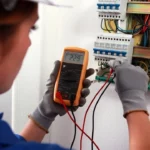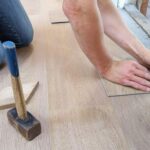Hey there! I’m Sam from Qualify Me!, Australia’s leading RPL (Recognition of Prior Learning) company. If you’ve been working in the construction industry for a while but don’t have formal qualifications, you’re probably already aware of how important a carpentry qualification can be in unlocking new opportunities.
Here at Qualify Me!, I’ve helped hundreds of people just like you turn their hard-earned skills into nationally recognised qualifications. Today, I want to talk about how getting your CPC30220 Certificate III in Carpentry can set you up for a successful career and how you can achieve this qualification quickly without going through years of training.
Why You Need a Carpentry Qualification
Let’s face it—Australia’s construction industry is booming, and qualified carpenters are in high demand. But without formal qualifications, you might be missing out on better pay, more jobs, and higher job security.
As I always say, “A formal qualification doesn’t just validate your skills—it opens doors to bigger and better projects.”
You might already have years of experience, but a nationally recognised carpentry qualification is what employers are looking for. It’s a must if you want to work on major construction sites or start your own carpentry business.
Fast-Track Your Carpentry Qualification with RPL
Here’s the good news: you don’t need to go back to TAFE or spend years in an apprenticeship to get qualified. With Recognition of Prior Learning (RPL), you can use the skills and experience you already have to fast-track your carpentry qualification.
At Qualify Me!, we’ve designed a streamlined process that’s quick and easy:
- Skills Assessment: We start with a free skills assessment to determine your eligibility.
- Portfolio of Evidence: You’ll gather proof of your experience (such as photos of your work, references, and certificates).
- Competency Check: We review your skills and ensure everything meets the standards.
- Get Qualified: Once everything’s in order, you’ll receive your nationally recognised carpentry qualification.
This process could save you years of formal training. And the best part? You’ll be ready to take on bigger roles and increase your earning potential.
"At Qualify Me!, we believe in turning your experience into qualifications fast, so you can keep moving forward in your career without slowing down."
The Skills You’ll Gain with a Carpentry Qualification
When you complete your carpentry qualification, you’ll gain a wide range of practical skills that are essential on any job site:
- Framing and formwork: You’ll learn how to construct the skeleton of buildings, which is a fundamental skill for any carpenter.
- Blueprint reading: Understanding how to read and interpret building plans is crucial for accurate construction.
- Building codes and safety regulations: You’ll be fully aware of Australia’s construction laws and ensure that every project meets safety standards.
These skills will make you stand out from the competition and give you the confidence to take on more complex projects.
Career Opportunities with a Carpentry Qualification
Once you’ve secured your CPC30220 Certificate III in Carpentry, you’ll have access to a wide range of job opportunities:
- Residential Carpenter: Work on homes, renovations, and extensions.
- Commercial Carpenter: Get involved in large-scale construction projects like office buildings, schools, or shopping centres.
- Formwork Carpenter: Specialise in creating the molds for concrete structures, an essential skill for infrastructure projects.
And if you’re thinking about starting your own carpentry business, a formal qualification is your golden ticket to get registered and insured as a contractor.
"With a carpentry qualification, you’re not just another tradie—you’re a skilled professional who’s ready to take on any job."
Frequently Asked Questions About Carpentry Qualifications
How long does it take to get a carpentry qualification through RPL?
The RPL process can be completed much faster than traditional training methods. At Qualify Me!, we typically see our clients qualify within a few months, depending on how quickly they can gather their evidence.
What is the CPC30220 Certificate III in Carpentry?
The CPC30220 Certificate III in Carpentry is the nationally recognised qualification for carpenters in Australia. It covers essential skills like framing, formwork, and blueprint reading.
Can I apply for RPL if I have informal carpentry experience?
Absolutely! Recognition of Prior Learning is designed for people who’ve gained their skills on the job, whether that’s through informal work or previous training.
Why should I get a carpentry qualification if I already have experience?
Without a formal qualification, you could be missing out on better job opportunities and higher pay. A carpentry qualification shows employers that your skills meet national standards and that you’re ready to take on more responsibility.
How does getting qualified through Qualify Me! help me locally?
As Australia’s leading RPL company, Qualify Me!, we specialise in helping local tradies fast-track their qualifications. This gives you an edge in your local job market, helping you stand out from the crowd and secure better contracts.
How to Get Started with Qualify Me!
Ready to take the next step? At Qualify Me!, we make the process as simple as possible. Whether you’ve been working as a carpenter for 2 years or 20, we can help you get your carpentry qualification fast. And if you’re looking for a local RPL company you can trust, you can always check out our Google reviews here.
"Getting your qualification shouldn’t slow you down. With Qualify Me!, it’s quick, easy, and tailored to your experience."
Conclusion
A carpentry qualification is the key to unlocking better job opportunities, higher pay, and more job security in Australia’s booming construction industry. With Qualify Me!, you can fast-track your certification and start enjoying the benefits of being a fully qualified carpenter.
Excited by the idea of igniting a room and seeing a circuit bring a home or commercial space to life? A RPL qualification in electrotechnology might just be what you’re after. But what exactly is involved in electrotechnology and how do you get started? Unlike other trades, the journey to becoming a fully qualified sparkie takes a little longer.
As you can imagine with any vocation that poses the threat of electrocution, it’s important to have a technically sound understanding before you venture into the real world of rearranging power points and solving broken circuits.
We often see people from other trades looking to become qualified in electrotechnology via a RPL certificate.
Fun fact: arborists brisbane and building and pest inspectors Perth are the most common converts to electrotechnology!
Sparkie : What is electrotechnology?
Electrotechnology is the broader term used to describe the physics behind electrical systems and the role of electricity in technology. Typically, electrotechnology certificates provide the foundations for those pursuing a career as an electrician. Tertiary institutions offer courses in the area of study to provide an understanding of how circuits work, low voltage installations and resolving issues with electrical equipment.
In order to become an electrician in Australia, you’re required to complete a Certificate III in Electrotechnology Electrician as well as undertaking an apprenticeship. Once you’ve satisfied the requirements of the state’s governing body, you’ll be eligible for an Electrician’s License and be able to offer your services.
Is electrotechnology the same as an electrician?
Electrotechnology is the field of study where as an electrician is a possible career path after completing the course. Although most students who complete the certificate end up as an electrician, it’s not the only job they can fall into.
How do I get an Electrotechnology Certificate in Australia?
Tertiary institutions offer a Certificate III in Electrotechnology Electrician. The course usually takes four years to complete and includes meeting the Electrical Regulatory Authorities Council (ERAC) requirements for an Electrician’s License. This permit allows you to do electrical wiring work in your relevant state, regardless of whether you’re working on residential, commercial or industrial buildings.
The four-year estimated length also includes an apprenticeship, which gives you the practical training and skills required for real-life situations.
Although you can complete short courses and take virtual classrooms to become an electrician online, you’re still required to receive practical training on-site and some parts of the job are better taught in person.
You should always check in with the governing body that applies to you to see what the latest requirements are for you to perform work.
What work does electrotechnology include?
Electrotechnology provides the knowledge to design, maintain, install and repair electrical and electronic equipment. While most who complete the course progress to becoming an electrician, there are also possible career paths in telecommunications, manufacturing and construction.
According to the Australian Industry and Skills Committee (AISC), the top five occupations in demand are:
- Electricians
- Electronics Trades Workers
- Airconditioning and Refrigeration Mechanics
- Electrical Engineering Draftspersons and Technicians
- Telecommunications Trades Workers
Many licensed electricians also complete a Diploma of Electrical Engineer to brush up on their knowledge and to work more closely with professional engineers.
How do I become an electrician and get an Electrician’s Licence?
Just like other trades, qualifying for an Electrician’s License takes more than a certificate. Each state has its own set of requirements, but typically, governing bodies expect you to have a Certificate III in Electrotechnology Electrician, a certificate of proficiency and 12 months experience employed by a licensed electrician.
If you complete your course as part of an apprenticeship, you’ll be equipped with the relevant practical knowledge needed to satisfy the conditions. However, it is always best to check that your apprenticeship covers the conditions to be eligible for an Electrician’s License.
Thinking about a change of scenery? See if your current skills can fast track you to a more electrifying career by heading to Qualify Me.














Hi,
I worked as a TA electrician for 2 years in the UK back in 2012-2014 and I am currently a 2ned year apprentice here in Australia.
Is there a way I could knock some time off my apprenticeship in Australia with the experience I’ve got from the UK?
Hi Sam Sutherland,
Please call 1800 765 295 or simply fill in the form on the contact us page and we will be in touch
I have a lot of RPL and craft certifacte.
Hi Joseph Nolan,
Please call 1800 765 295 or simply fill in the form on the contact us page and we will be in touch